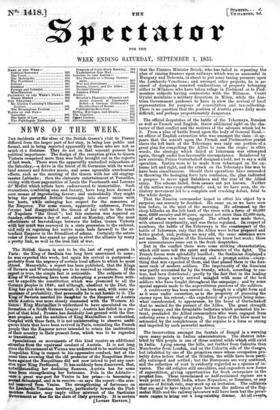The official despatches of the battle of the Tchernaya, Russian
as well as French and English, throw additional light on the cha- racter of that conflict and the motives of the advance which led to it. From a plan of battle found upon the body of General Read— an officer of English extraction who was amongst the slain—it ap- pears that the assault upon the French and Piedmontese posted above the left bank of the Tchernaya was only one portion of a great plan for compelling the Allies to raise the siege; in other
words, the for, which failed at Inkerman was attempted
again, though under less favourable circumstances. Reinforced by new arrivals, Prince Gortschakeff designed a bold, not to say a wild operation. Sorties were to be made from Sebastopol on the ex- treme left and right, and the attack on the Tchernaya line was to have been simultaneous. Should their operations have succeeded in throwing the besieging force into confusion, the plan indicated a purpose to move upon Balaklava and the rear of the Allied camp. The scheme failed, from causes not yet known. Neither of the sorties was even attempted ; and, as we have seen, the in- itiatory movement led to a complete and crushing defeat, fatal to the whole design. That the Russian commander hoped to effect his object by a surprise can scarcely be doubted. He came on, as we have seen him before, in the mist of the morning. He advanced up the steep hillocks on the left bank of the river with a force of 60,000 men, 6000 cavalry and 60 guns, against not more than 22,000 men, 5500 of whom were not engaged. The attack was made thrice,
with unusual impetuosity, and was thrice repulsed. In respect of numbers the battle of the Tchernaya is the counterpart of the battle of Inkerman, only that the Allies were better prepared and better posted, and, perhaps we may add, the same mistakes were not made. The repulse of the Russians we knew last week ; these new circumstances come out in the fresh despatches.
But in the conflict there were some striking characteristics, which still more tell the spirit and character of the fight, • The French forces were splendidly handled; the Sardinian displayed a steady coolness, a military bearing, and a prompt action—every- thing that was expected of them, and that planed them in the fore- most rank of modern soldiers. The impetuosity of the Russians was partly accounted for by the brandy, which, according to cus- tom, had been distributed ; partly by the fact that in the leading
columns troops newly arrived mingled with some of the best soldiers who have fought throughout the campaign; and by some special appeals made to the superstitious passions of the soldiers.
A controversy has been carried on, though in a slight form and as it were under correction, as to the propriety of pursuing the enemy upon his retreat,—the expediency of a pursuit being some- what corroborated, to appearance, by the boast of Gortschakoff that he waited for the pursuit of the Allies. The great strength of the enemy, and the formidable batteries which protected his re- treat, precluded the Allied commanders who were engaged from ordering even a charge of cavalry. The force of the blow must be estimated by the completeness of the repulse to a foroe so strong and impelled by such powerful motives.


























